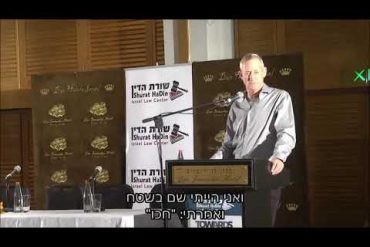On March 11th 2013, an hour-long documentary entitled “A History of Syria with Dan Snow” was broadcast on BBC Two. An accompanying article under the heading “Syria’s priceless heritage under attack” appeared in the Magazine section of the BBC News website on March 10th.
[youtube=http://www.youtube.com/watch?v=YN6oD2Vc9B8]
Readers familiar with the history themselves will no doubt have noticed that in Dan Snow’s extensive portrayal of the rich tapestry of ethnic groups making up Syria throughout its history, one particularly ancient community was conspicuous by its absence. No mention whatsoever was made of the centuries-old Jewish community of Syria, either in the television programme or in Snow’s written article which featured the city of Haleb (Aleppo) – home to Jews for millennia and formerly one of the oldest Jewish communities in the world – very prominently.
Towards the end of the film (at 57:32 in the version above), Snow informs viewers that: 
“Between eruptions of violence, there is actually a long-standing tradition of tolerance and opposition to extremism in Syria.”
That portrayal of course airbrushes out the persecution of Jews in Syria completely, as well as their subsequent flight from the country.
Another no less amazing bout of airbrushing – especially coming from someone with a background in modern history – appears at 34:23 in the above video when Dan Snow tells his audience:
“In 1967 [Hafez al] Assad was Minister of Defence when Israel launched a series of strikes against Egypt, Jordan and Syria. The Israelis humiliated Arab forces and took control of part of Syria; the Golan Heights.”
Snow of course fails to inform his audiences that the Golan Heights can only be considered to have been “part of Syria” for a maximum of 45 years before 1967, but it is his one-liner on the subject of the Six Day War which in particular stands out as a blatant breach of BBC Editorial Guidelines on accuracy.

Viewers are given no inkling of the events leading up to that war; indeed they might reasonably conclude from Snow’s account that Israelis simply woke up one morning and decided to attack three of the surrounding countries. Snow avoids any mention of the Arab League project to divert the headwaters of the Jordan River (the source of Israel’s main water supply at the time) and the relentless Syrian attacks upon Israeli communities below the Golan Heights during the years preceding the Six Day War.
He completely ignores the build-up to the war, including Egypt’s massing of troops in the Sinai and its expulsion of the UN forces from that area, after which Nasser informed the Arab world by radio that:
“As of today, there no longer exists an international emergency force to protect Israel. We shall exercise patience no more. We shall not complain any more to the UN about Israel. The sole method we shall apply against Israel is total war, which will result in the extermination of Zionist existence.”

Likewise Snow fails to mention the massing of Syrian troops in the Golan Heights on May 18th 1967 and the bellicose statement made by Hafez al Assad two days later:
“Our forces are now entirely ready not only to repulse the aggression, but to initiate the act of liberation itself, and to explode the Zionist presence in the Arab homeland. The Syrian army, with its finger on the trigger, is united….I, as a military man, believe that the time has come to enter into a battle of annihilation.”
The closure of the Straits of Tiran on May 22nd 1967 – a clear casus belli, as noted by President Lyndon Johnson at the time – is also ignored by Snow, as are the subsequent almost daily statements put out by Nasser.
“Our basic objective will be the destruction of Israel. The Arab people want to fight,” (May 27th 1967)
“We will not accept any…coexistence with Israel…Today the issue is not the establishment of peace between the Arab states and Israel….The war with Israel is in effect since 1948.” (May 28th 1967)

“The armies of Egypt, Jordan, Syria and Lebanon are poised on the borders of Israel…to face the challenge, while standing behind us are the armies of Iraq, Algeria, Kuwait, Sudan and the whole Arab nation. This act will astound the world. Today they will know that the Arabs are arranged for battle, the critical hour has arrived. We have reached the stage of serious action and not declarations.” (May 30th, 1967 – following the signing of the defence pact with Jordan.)
While Israel did indeed launch pre-emptive strikes on the Egyptian air-force on June 5th 1967, that was of course far from either the beginning or the end of the Six Day War as Snow so erroneously implies.
This is far from the first time that the BBC has broadcast or published politically motivated historically revisionist versions of events surrounding the Six Day War. This blog post from CMEW regarding a complaint already made to the BBC about Snow’s above statement suggests, however, that the BBC chooses to remain bunkered in its ahistorical view of those events.
It is high time for the BBC to ensure adherence to its own Editorial Guidelines on accuracy and impartiality with regard to this subject and to cease the advancement of political narratives under the guise of “history”. It is the BBC’s self-declared role to contribute to audiences’ knowledge of the world – not to seek to manipulate viewers’ political opinions regarding the Middle East or any other region.





